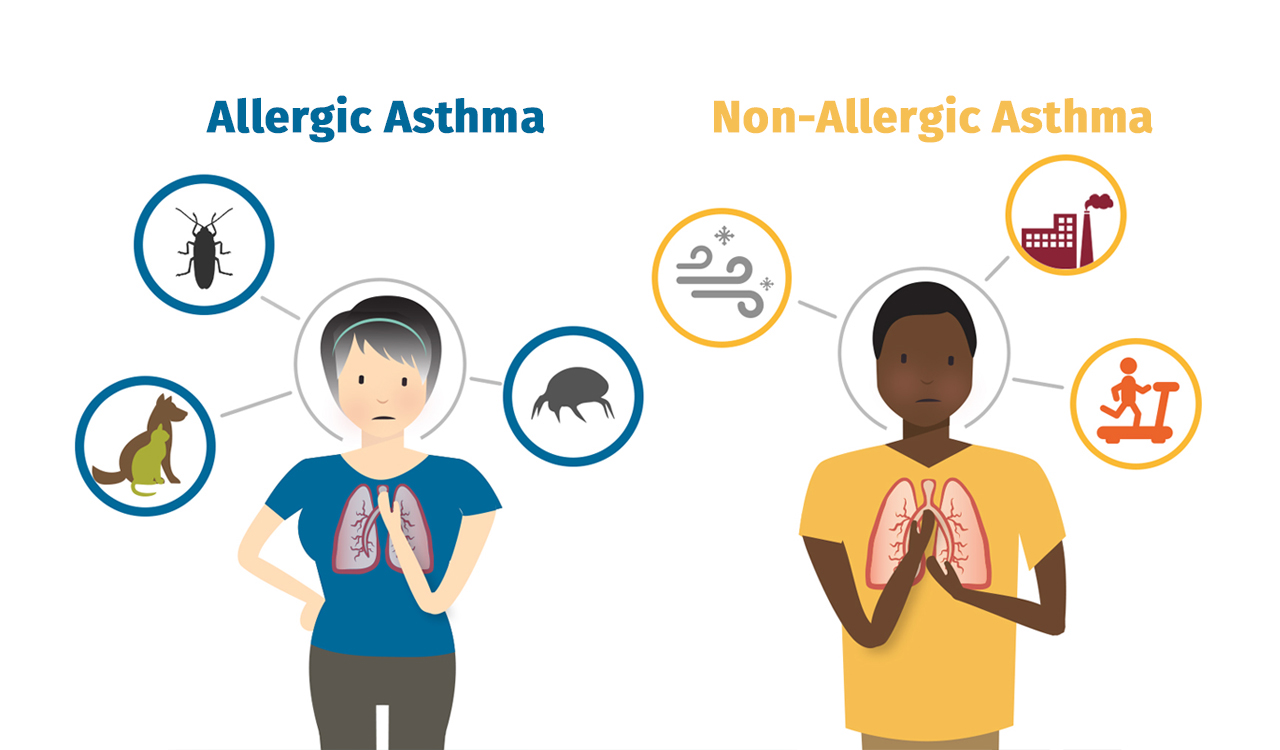Asthmatic, Blown, Choking, Emphysematous, Exhausted, Gasping, Gulping, Out of breath.
Root Cause of Disease
The most common factors for developing asthma are having a parent with asthma, having a severe respiratory infection as a child, having an allergic condition, or being exposed to certain chemical irritants or industrial dust in the workplace.
Symptoms
Asthma symptoms vary from person to person. You may have infrequent asthma attacks, have symptoms only at certain times — such as when exercising — or have symptoms all the time.
Asthma signs and symptoms include:
- Shortness of breath
- Chest tightness or pain
- Wheezing when exhaling, which is a common sign of asthma in children
- Trouble sleeping caused by shortness of breath, coughing or wheezing
- Coughing or wheezing attacks that are worsened by a respiratory virus, such as a cold or the flu
Causes
- Family history
If you have a parent with asthma, you are three to six times more likely to develop asthma than someone who does not have a parent with asthma. - Allergies
Some people are more likely to develop allergies than others, especially if one of their parents has allergies. Certain allergic conditions, such as atopic dermatitis (eczema) or allergic rhinitis (hay fever),are linked to people who get asthma. - Viral respiratory infections
Respiratory problems during infancy and childhood can cause wheezing. Some children who experience viral respiratory infections go on to develop chronic asthma. - Occupational exposures
If you have asthma,exposures to certain elements in the workplace can cause asthma symptoms. And, for some people, exposure to certain dusts (industrial or wood dusts), chemical fumes and vapours, and molds can cause asthma to develop for the very first time. - Smoking
Cigarette smoke irritates the airways. Smokers have a high risk of asthma. Those whose mothers smoked during pregnancy or who were exposed to second-hand smoke are also more likely to have asthma.Learn more about the health effects of smoking with asthma - Air Pollution
Exposure to the main component of smog (ozone) raises the risk for asthma. Those who grew up or live in urban areas have a higher risk for asthma. - Obesity
Children and adults who are overweight or obese are at a greater risk of asthma. Although the reasons are unclear, some experts point to low-grade inflammation in the body that occurs with extra weight. Obese patients often use more medications, suffer worse symptoms and are less able to control their asthma than patients in a healthy weight range.
Home Remedies to treat Asthma
Remedy- 1: Diet for asthma

While there is no evidence that a specific diet or group of foods prevents or treats asthma, improving your overall health through a healthy diet can have a positive effect. Asthma is a chronic inflammatory disease, which means that your immune system overreacts to non-harmful substances like pollen in your airways. While an inflammatory reaction can help protect you when a dangerous particle enters your body, it can also cause symptoms like swelling in your airways that can restrict your breathing. For this reason, it may help asthma symptoms to eat foods that fight inflammation. “I would recommend a whole food diet that is high in antioxidants, live cultures, and omega-3 fatty acids,”. This type of diet should include:
- Leafy greens like spinach and kale
- Berries like cherries and raspberries
- Whole grains like oats and brown rice
- Fatty fish like salmon and tuna
- Nuts and beans
- Yogurt, sauerkraut, and other fermented foods
- Caffeine is found in coffee, tea, cola drinks and cocoa. Caffeine is a drug that is very similar to theophylline. Theophylline is a bronchodilator drug that is taken to open up the airways in the lungs and therefore relieve the symptoms of asthma, such as wheezing, coughing and breathlessness. Scientists are interested in finding out whether caffeine has the same effect on the lungs as theophylline.
Product link: Caffeine, Yogurt, Raspberries
Remedy- 2: Yoga

Procedure: Yoga
- Sit in a chair. Relax your neck and shoulders.
- Inhale slowly through your nose to the count of two. Keep your lips puckered, as if you’re about to blow out a candle.
- Exhale slowly through your lips to the count of 4. Release all the air from your lungs.
- Repeat until your breathing returns to normal.
Diaphragmatic breathing:
If you have asthma, your body must work extra hard to breathe. It reduces this effort by opening the airways, strengthening your abdominal muscles, and increasing your lung and heart function. This exercise may help soothe your asthma symptoms.
- Sit in a chair or lie down in bed. Place one hand on your belly so you can feel it moving in and out.
- Inhale slowly through your nose. You should feel your stomach move out, filling with air like a balloon.
- Exhale through pursed lips, two or three times longer than your inhale. Your stomach should move in as the air flows out.
- During this exercise, your chest should stay still. You can place your other hand on your chest to make sure it doesn’t move.
Remedy – 3: Turmeric
Materials: Turmeric

Fermented turmeric preparations, commonly sold as tea products, claim to have higher concentrations of biologically available, or absorbable, curcumin.
Procedure:
- Bring water or milk to a boil.
- Add the other ingredients to the boiling liquid.
- Steep for 10–15 minutes.
Product link: Turmeric
Other Remedies
Pomegranate peel Extract
Pomegranate peel extract is a natural substance sold in dietary supplement form. It is sourced from the peel of the pomegranate fruit. Pomegranate fruit is often touted as a top source of antioxidants including vitamin C. The use of dietary supplements containing pomegranate peel extract is said to provide a large range of health benefits including the treatment of asthma. Pomegranate peel extract contains ellagitannins, which are compounds known to reduce inflammation. This is a very crucial property and serves significantly in asthma treatment.
Green Tea
Green Tea is considered by many to be nature’s healthiest beverage and is very rich in antioxidants that would help in asthma treatment. Green Tea is lower in caffeine than other caffeinated beverages and contains the amino acid L-theanine shown to induce relaxation and relieve stress which is one of the major emotional causes of asthma.
Hibiscus
Hibiscus is a plant said to offer several health benefits. Scientific research suggests that hibiscus tea or hibiscus extracts may offer antioxidant effects and this is significant in the elimination of allergens in asthma treatment.
Preventions
Some of the preventions of asthma are:
Stay Away from Allergens
If you have allergies and asthma, it’s important to keep your distance from allergens (things you’re allergic to). Allergen exposure can increase the inflammation in your airways for a while, making an attack more likely.
Prevent Colds
Do what you can to stay well. Avoid close contact with people who have a cold or the flu, because catching it will make your asthma symptoms worse. Wash your hands well if you handle items that someone with a respiratory infection may have touched.
Allergy-Proof Your Home
Whether you’re at home, work, or traveling, there are things you can do to allergy -proof your environment and lower your chances of an asthma attack. Don’t eat in restaurants that are smoky or allow cigarette smoking. Reserve a smoke-free hotel room. If you can, bring your own bedding and pillows in case the hotel only supplies feather pillows and down comforters. They can house dust mites and cause asthma symptoms.
Use a Home Peak Flow Meter
The meter shows how well air is moving through your lungs. During an attack, your airways narrow. The meter can let you know this is happening hours or days before you have any symptoms. This gives you time to take the medications listed in your treatment plan and possibly stop the attack before it starts.




